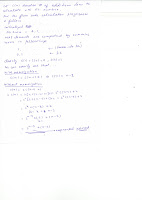;some code from book
(define (stream-enumerate-interval low high)
(if (> low high)
the-empty-stream
(cons-stream
low
(stream-enumerate-interval (+ low 1) high))))
(define (display-stream s)
(stream-for-each display-line s))
(define (display-line x)
(newline)
(display x))
(define (add-streams s1 s2)
(stream-map + s1 s2))
(define (integers-starting-from n)
(cons-stream n (integers-starting-from (+ n 1))))
(define integers (integers-starting-from 1))
(define (scale-stream stream factor)
(stream-map (lambda (x) (* x factor)) stream))
Ex 3.53
Given definition defines a stream whose first term is 1, and next terms are calculated by adding previous term to itself. So the resulting stream is..
1,2,4,8,16...
Lets Verify...
(define s (cons-stream 1 (add-streams s s)))
1 ]=> (stream-ref s 0)
;Value: 1
1 ]=> (stream-ref s 1)
;Value: 2
1 ]=> (stream-ref s 2)
;Value: 4
1 ]=> (stream-ref s 3)
;Value: 8
1 ]=> (stream-ref s 4)
;Value: 16
1 ]=> (stream-ref s 5)
;Value: 32
Ex - 3.54
(define (mul-streams s1 s2)
(stream-map * s1 s2))
(define factorials (cons-stream 1 (mul-streams integers factorials)))
Ex-3.55
Partial-sums of a stream is a stream whose first term is that of the input stream and next terms are calculated by adding next term of the input stream and previous term of the Partial-sums of the stream.
(define (partial-sums s)
(cons-stream (stream-car s)
(add-streams (stream-cdr s) (partial-sums s))))
;Verify
(define s (partial-sums integers))
1 ]=> (stream-ref s 0)
;Value: 1
1 ]=> (stream-ref s 1)
;Value: 3
1 ]=> (stream-ref s 2)
;Value: 6
1 ]=> (stream-ref s 3)
;Value: 10
1 ]=> (stream-ref s 4)
;Value: 15
1 ]=> (stream-ref s 5)
;Value: 21
Ex-3.56
(define (merge s1 s2)
(cond ((stream-null? s1) s2)
((stream-null? s2) s1)
(else
(let ((s1car (stream-car s1))
(s2car (stream-car s2)))
(cond ((<> s1car s2car)
(cons-stream s2car (merge s1 (stream-cdr s2))))
(else
(cons-stream s1car
(merge (stream-cdr s1)
(stream-cdr s2)))))))))
(define S (cons-stream 1 (merge
(merge (scale-stream s 2) (scale-stream s 3))
(scale-stream s 5))))
Ex-3.57

Ex-3.58
first element is (quotient (* num radix) den)
and next elements are calculated recursively from
num = (remainder (* num radix) den) with same radix and den.
(define (expand num den radix)
(cons-stream
(quotient (* num radix) den)
(expand (remainder (* num radix) den) den radix)))
(expand 1 7 10) should be
1 4 2 8 5 7....
;From the interpreter
1 ]=> (define s (expand 1 7 10))
;Value: s
1 ]=> (stream-ref s 0)
;Value: 1
1 ]=> (stream-ref s 1)
;Value: 4
1 ]=> (stream-ref s 2)
;Value: 2
1 ]=> (stream-ref s 3)
;Value: 8
1 ]=> (stream-ref s 4)
;Value: 5
Ex-3.59
;(a)
;inverted-integers = 1 1/2 1/3 1/4........
(define inverted-integers (stream-map (lambda (x) (/ 1 x)) integers))
(define (integrate-series s)
(mul-streams s inverted-integers))
;(b)
(define cosine-series
(cons-stream 1 (integrate-series (stream-map (lambda (x) (- x)) sine-series))))
(define sine-series
(cons-stream 0 (integrate-series cosine-series)))
Ex-3.60
(define (mul-series s1 s2)
(cons-stream (* (stream-car s1) (stream-car s2))
(add-streams
(scale-stream (stream-cdr s1) (stream-car s2))
(mul-series s1 (stream-cdr s2)))))
(define one (add-streams
(mul-series sine-series sine-series)
(mul-series cosine-series cosine-series)))
;verification, only constant term is 1
;rest all is 0
1 ]=> (stream-ref one 0)
;Value: 1
1 ]=> (stream-ref one 1)
;Value: 0
1 ]=> (stream-ref one 2)
;Value: 0
1 ]=> (stream-ref one 3)
;Value: 0
1 ]=> (stream-ref one 4)
;Value: 0
1 ]=> (stream-ref one 5)
;Value: 0
Ex-3.61
(define (invert-unit-series s)
(cons-stream 1
(stream-map (lambda (x) (- x))
(mul-series
(stream-cdr s)
(invert-unit-series s)))))
;Test
;secX = 1/cosX
(define sec-series (invert-unit-series cosine-series))
1 ]=> (stream-ref cosec-series 0)
;Value: 1
1 ]=> (stream-ref cosec-series 1)
;Value: 0
1 ]=> (stream-ref cosec-series 2)
;Value: 1/2
1 ]=> (stream-ref cosec-series 3)
;Value: 0
1 ]=> (stream-ref cosec-series 4)
;Value: 5/24
1 ]=> (stream-ref cosec-series 6)
;Value: 61/720
1 ]=> (stream-ref cosec-series 8)
;Value: 277/8064
Ex-3.62
;one-zeros = 1 0 0 0 0 0........
(define zeros (cons-stream 0 zeros))
(define one-zeros
(cons-stream 1 zeros))
;s1/s2 = s1.(1/s2)
;we'll have to bring out the constant term from s2 so as
;to make the constant term 1
(define (div-series s1 s2)
(scale-stream
(mul-series s1
(invert-unit-series
(scale-stream s2 (/ 1 (stream-car s2)))))
(/ (stream-car s2))))
;tanX = sinX/cosX
(define tangent-series
(div-series sine-series cosine-series))
1 ]=> (stream-ref tangent-series 0)
;Value: 0
1 ]=> (stream-ref tangent-series 1)
;Value: 1
1 ]=> (stream-ref tangent-series 2)
;Value: 0
1 ]=> (stream-ref tangent-series 3)
;Value: 1/3
1 ]=> (stream-ref tangent-series 4)
;Value: 0
1 ]=> (stream-ref tangent-series 5)
;Value: 2/15
1 ]=> (stream-ref tangent-series 7)
;Value: 17/315
1 ]=> (stream-ref tangent-series 9)
;Value: 62/2835
1 ]=> (stream-ref tangent-series 11)
;Value: 1382/155925
